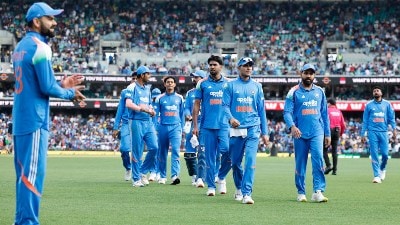Consensus on Pak policy: PM
BONN, May 24: Prime Minister Atal Behari Vajpayee has said India's policy towards Pakistan is based on national consensus and the country wa...

BONN, May 24: Prime Minister Atal Behari Vajpayee has said India8217;s policy towards Pakistan is based on national consensus and the country wants 8220;good relations8221; with China. He dismissed suggestions that nuclear tests were conducted due to domestic political compulsions.
8220;India will continue its policies pursued so far towards Islamabad,8221; Vajpayee said in an interview to a leading German weekly Der Spiegel.8220;A stable, secure, and prosperous Pakistan is in India8217;s own interest,8221; he said, adding New Delhi always desired with Islamabad, a relationship of friendship and cooperation based on mutual respect and regard for each others8217; concerns.
India has consistently urged Pakistan to pursue a path of negotiation to solve those issues on which the two countries do not see eye to eye. The resumption of Indo-Pak dialogue last year at New Delhi8217;s instance had the support of all political parties, including the BJP, he said.
Vajpayee said, 8220;I K Gujral, both as prime minister and minister for externalaffairs, was in close touch with BJP on many aspects of the Pakistani policy. The proposals given to Pakistan in Dhaka regarding the modalities of dialogue between the two countries were worked out in consultation with my party.8221; Vajpayee said India wanted good ties with China too. 8220;This would contribute to promoting peace, stability, and development in the region and in the world at large.8221;
8220;We will continue to improve and broaden our relationship. We see it as one in which both sides are equally responsive to each others8217; concerns,8221; he said. India is looking forward to continuing its dialogue with China to create the foundation for a stable and long-term relationship, he said, pointing out that there had been greater contacts between the two countries in recent years, especially at the political level. Trade and economic interaction was also on the rise.
To a question suggesting the recent nuclear tests were timed so because of domestic political compulsions, including the attitude of somecoalition partners, he said they were an achievement of the scientists and engineers of the country and 8220;that should put at rest any doubts in this regard8221;.He said the tests had been conducted as a 8220;deterrent8221; meant only for self-defence and not undertaken at the cost of the country8217;s economy, and asserted this would be the case in the future too. Asserting the tests would not lead to an arms race in South Asia, Vajpayee said New Delhi8217;s objective was to provide its people with a sense of security which was necessary as nuclear weapons were present in India8217;s immediate neighbourhood.
Asked whether India was planning to sign the CTBT, Vajpayee said New Delhi had already declared a 8220;voluntary moratorium8221; to ban nuclear tests, thus fulfilling the primary obligation of the treaty. 8220;Our participation in the CTBT should be viewed in the context of our concerns relating to the overall nuclear non-proliferation regime,8221; he said.
8220;India8217;s actions did not in any way dilute its commitment to anuclear-weapon-free world which we are convinced will enhance the security of every single country and that of the planet as a whole,8221; he said.
- 01
- 02
- 03
- 04
- 05































